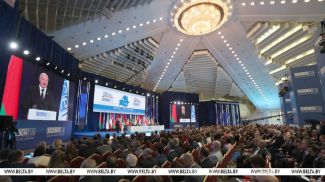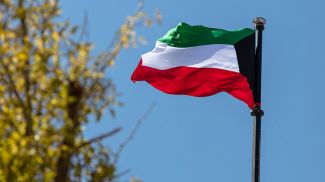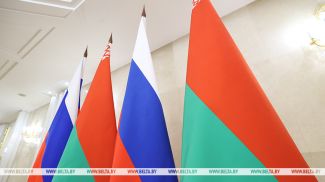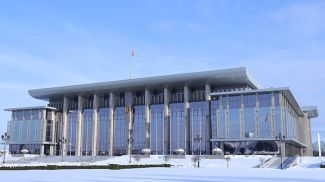
MINSK, 13 September (BelTA) - There is absolutely no fault of Belarus in the aggravation of relations with the Armenian authorities, Belarusian President Aleksandr Lukashenko said as he met with representatives of different nationalities living in Belarus at the Palace of Independence on 12 September, BelTA has learned.
Chairman of the Minsk city Armenian cultural and educational society Hayastan Georgy Yeghiazaryan spoke at the event. He also serves as Chairman of the Advisory Council at the Commissioner for Religious and Ethnic Affairs. Georgy Yeghiazaryan thanked the president for the state's attention to the development of cultures of different national communities, preservation of peace and harmony.
Speaking to the media after the meeting Georgy Yeghiazaryan noted that he poorly assesses the current Belarusian-Armenian relations at the political level, while the relations between people remain as good as they have always been. It is also important not to abandon former friends in search of new partners. “I understand: one can turn to the West, to the European Union (this is about Armenia), but one should not spoil relations with their friends either. Belarus and Russia are not alien countries. Politicians should find a common language. We always find common ground between people,” the chairman of the Armenian association said. “Many people buy [propaganda] that it will be a bright future and we will go there and the sun will shine brightly there for us. I believe that the sun must shine, but you better not turn off the light elsewhere either. Why ruin relationships with friends? I believe we should restore friendship after all.”
“I thought while listening to your speech that it would be good if we had good relations with Armenia, as we used to before, regardless of all the shortcomings and nuances. Believe me, there is no our fault in this situation,” the head of state said. “Today it is clear to everyone who follows politics, why the current Armenian leadership has pursued such a policy. They made a decision to hold a referendum in Armenia on joining the European Union.”
“It is clear that it started long time ago. I warned Nikol Pashinyan that he should not do this. All these talks were behind closed doors. It started [with meetings] in St. Petersburg, when he just became prime minister. I told him then: “You are a young and inexperienced man (we have one of those in the south, you know). Take your time, work for a while, look around.” You know what ideas he came to power with,” the Belarusian head of state said.

He admitted that the “first attacks” on Belarus came from the Armenian authorities. “It is clear that he aimed at us but tried to get to Russia. Putin and I saw it perfectly well, understood it. I told Putin and he told me that we should not aggravate relations, so that the Armenian people would not think that we are against Armenians. As you can see, we did not react in any way,” the president said. “Today it is already clear: the Europeans will demand from the Armenian leadership to do something before he joins their space. The USA is behind the Europeans. Nothing is done in the West without the approval of the USA. They have put Armenia under pressure.”
Aleksandr Lukashenko drew attention to the recent past, because this is how everything started in Ukraine. “You know what situation Armenia is in. We tried to help Armenians in every possible way, cooperated with them. What happened in Karabakh is only the fault of the Armenian authorities,” the Belarusian leader stressed. “I warned them personally, when all the heads of state were either silent or against it: I suggested to give them [to Azerbaijan] these territories. Moreover, they [Armenian authorities] recognized that those were not their territories. Even birds did not land or fly on those territories, i.e. there were no people there, no one lived there. People did not live in such a great natural environment, where the land was fertile. More than a million refugees. I saw them in Azerbaijan.”
The president recalled that he called for peace in the region, but Armenia had a different position: “Yes, these are not our lands, they are Azerbaijani lands. But we will not give them away - we will fight”. “That was my line. I voiced it in Yerevan behind closed doors. Then I asked Putin to help. The two of us started asking Pashinyan to solve the problem. He said they will continue fighting. Then, why take offense at Russia or at us? You yourself recognized that Karabakh is the territory of Azerbaijan.”


Aleksandr Lukashenko emphasized the exceptionally good attitude towards the representatives of the Armenian diaspora in Belarus. “You are no longer Armenians for me. You are Belarusians for me. You are our people, our citizens,” he said.
The head of state noted a special attitude to people who come to Belarus not only from Armenia but also from other places. “You had to leave your country. You have such a destiny. We have to take you into our family and make you feel comfortable here, do everything so that you could work and live here,” the president said.
All those who came to Belarus are literate people who value their families. Some of them start families in Belarus. Aleksandr Lukashenko said that such mixed families usually give birth to beautiful and talented children: “The girls are beauties and the boys are smart people. I say it sincerely. This is my firm belief. Just take a look at families like this.”
“You are welcome to come here. Let families come here. There is enough work and land for everyone,” Aleksandr Lukashenko said.

As BelTA reported earlier, Aleksandr Lukashenko has repeatedly voiced the commitment to the development of Belarusian-Armenian relations, and also to the settlement of the conflict in the Caucasus region between Armenia and Azerbaijan. For example, at the summit in Yerevan in November 2022 he said the following: “Let's reach an agreement, let's do everything so that people don't die there. This will be gladly accepted in Armenian and Azerbaijani society”.
In addition to the topic of peaceful resolution of any conflicts, the head of state traditionally calls for the preservation and strengthening of cooperation in the CIS space in various formats, be it economic interaction in the EAEU format or military and political cooperation within the CSTO.
At the same time, the Armenian leadership made a number of ambiguous and counterproductive statements against not only Belarus, but also made steps towards curtailing cooperation in integration formats against the backdrop of domestic political events. For example, Armenian Prime Minister Nikol Pashinyan said that he would not come to Minsk anymore, and would not let other official representatives of his country do so.
“All of us see what a complicated domestic political situation is evolving in Armenia now, how rapidly the confrontation inside the country is getting worse. And, of course, how different people have different resistance to serious emotional pressure,” Anatoly Glaz, spokesman for the Belarusian Ministry of Foreign Affairs, told the media in June 2024. “If someone decided to divert attention from internal problems with the image of an external enemy, it is a very shortsighted position. It is important to understand that we have longstanding close, friendly relations and shared history with Armenia, and today we also enjoy mutually beneficial trade and close business contacts. We are not going to deteriorate these relations, no matter how much the Armenian leadership is pushed to do so by external players.”













